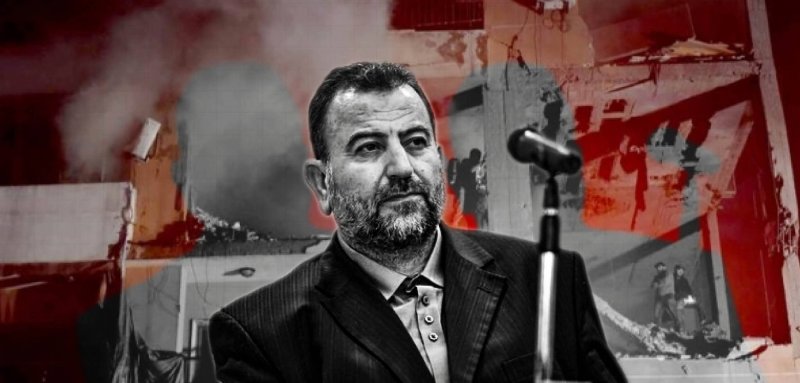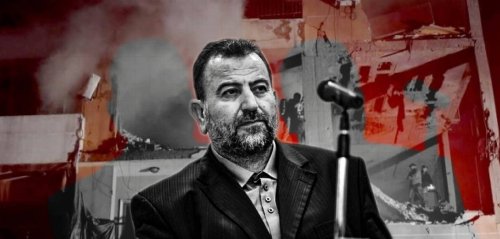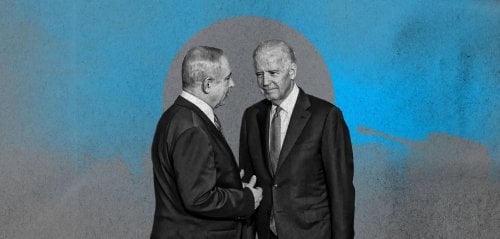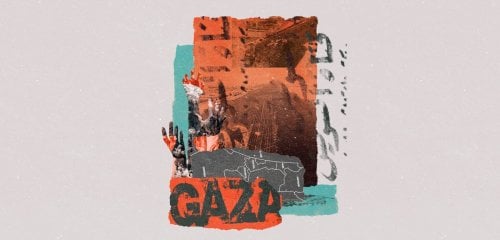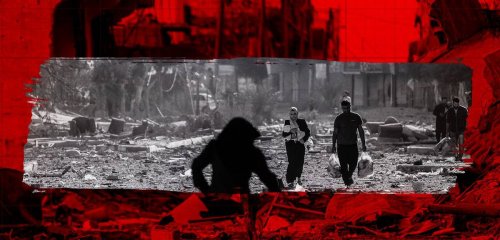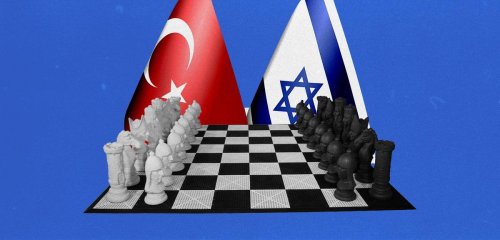“We entered the battle on the second day of the war on Gaza, and Operation Al-Aqsa Storm was 100 percent Palestinian in terms of both decision and execution.”
With this statement made on November 3, 2023, the leader of the Lebanese Hezbollah, Hassan Nasrallah, announced Lebanon's involvement in Operation Al-Aqsa Storm against Israel nearly a month after the party targeted Israeli military sites in southern Lebanon on October 8. The battle took on a specific geographical form, with defined rules of engagement and is referred to as Operation Isnad (support), for Hamas.
Nasrallah denied Hezbollah involvement in the Hamas attack on Israel on October 7, specifying the level of combat weapons and the military target locations for Israeli soldiers in exchange for a similar Israeli response to Hezbollah's targets.
However, the following week, clashes between Hezbollah and Israel intensified until Israel began to target civilians in the south of Lebanon. On October 13, Reuters journalist Issam Abdallah was killed by an Israeli rocket, and several of his colleagues were wounded.
In his widely anticipated speech, Nasrallah made clear that the question of whether the war would expand depended on Israel's actions towards Lebanon. He indicated that Israeli actions would inform Hezbollah, within a new equation, targeting civilians for civilians. 141 members of Hezbollah have been killed, in addition to the killing of numerous civilians and journalists, and the displacement of 74,000 civilians from southern Lebanon. Furthermore, a Lebanese soldier has been recorded killed in the latest toll since the start of the war.
A developing scene
As clashes have intensified in the South, multiple internal political moves were made to avoid dragging Lebanon into a comprehensive war, but with no guarantees to stop the war. The intensity of the clashes increased with the introduction of new weapons by the group, such as drones and the targeting of settlements in Israel, with some of these operations claimed by Hamas from Lebanese territories. On October 15, a number of operations were carried out, including the launch of a group of missiles into western Galilee. Additionally, an infiltration operation was conducted, aimed at pushing the party away from the front line, to prevent the war from spreading further, and as an attempt by Hamas to solidify its presence in Lebanon. Following this, ‘Vanguards of Al-Aqsa Flood’ were established on December 4, 2023, recruiting fighters to create an alternative or additional arena for the leaders and elements of Hamas outside of Gaza. This initiative will receive political and field cover from the leadership of Hezbollah, which aims to test its position as a key player on the Lebanese stage in the coming stage.
In his widely anticipated speech, Nasrallah, the leader of the Lebanese Hezbollah group, made clear that the question of whether the war would expand depended on Israel's actions towards Lebanon.
The establishment of this new branch for Hamas faced significant backlash within Lebanon, with many considering it a violation of Lebanese sovereignty. There were warnings of repeating past scenarios, such as involving the Palestine Liberation Organization, and fears of Israel repeating its invasion of Lebanon in 1982. These concerns coincided with statements by the head of the Israeli internal security apparatus, Ronen Bar, on the Israeli Public Broadcasting Corporation, in which he threatened to pursue Hamas leaders in both Lebanon and Turkey, even if this were to take years.
A political solution as an alternative?
In parallel with the escalation, initiatives emerged to cool down the southern front and neutralize Lebanon from the danger of drifting into a comprehensive war with Israel. On December 28, 2023, Dorothy Shea, US ambassador to Lebanon, proposed to demarcate the land borders. This would be done by preparing the conditions for implementing UN resolution 1701 and ending the dispute over 7 out of 13 points, in exchange for recognizing the Shebaa Farms and Hezbollah's withdrawal “behind the Litani River.”
This proposal is set to be discussed with the first mediator, Amos Hochstein, energy advisor to the US President. Hochstein is preparing to return to Beirut in early January to mediate between Lebanon and Israel and determine the land borders between the two countries, as announced by Shea during her farewell tour of Lebanon.
The establishment of this new branch for Hamas faced significant backlash within Lebanon, with many considering it a violation of Lebanese sovereignty. There were warnings of repeating past crises and fears of Israel repeating its invasion of Lebanon in 1982
As the United States presses for an end to the southern Lebanese front through the land delineation proposal, Israel demands the implementation of the proposal and the return of 80,000 settlers of the north to the settlements. However, the Israeli threat is gradually evolving, in case the international political settlement fails, through threats of a military maneuver to push Hezbollah away from the borders. This is according to Israeli Minister, Yoav Gallant, who spoke on Israeli Army Radio on December 7, 2023.
Assassinations
As the clashes in southern Lebanon have escalated, so too have Gallant's threats to launch a wide-ranging military operation in Lebanon, should Hezbollah refuse to implement the international settlement. This coincides with Hezbollah intensifying its targeting of Israeli sites, and the increase in shelling on several fronts against Israel, including by Yemen in the Red Sea and the targeting of American bases by Iranian militias in Syria.
On December 26th, Israel acted on its threats, and assassinated Reza Mousavi, a senior advisor in Iran's Revolutionary Guard, responsible for coordinating proxy forces in Syria, in an airstrike on the outskirts of Damascus, without Israel officially claiming responsibility. This attack has brought the issue of border delineation back to the forefront; In a press conference held on December 28, 2023, Israeli Cabinet member Benny Gantz threatened to carry out a wide-ranging military operation in the south of Lebanon against Hezbollah, stating, “Hezbollah Secretary-General Hassan Nasrallah needs to understand that he is next in line unless there is an immediate implementation of UN Security Council Resolution 1701.”
Al-Arouri and the violation of the rules of engagement
Next on Israel's list of targets was Salah al-Arouri, a Hamas leader residing in Beirut. Al-Arouri was deputy head of the political bureau of Hamas and the movement's leader in the West Bank. He was assassinated on January 2, 2024, by a drone attack on the movement's office in the southern suburbs of Beirut. The attack resulted in the deaths of two leaders and four members of Hamas, and several injured.
Al-Arouri is described as the “architect” of Hamas's attacks in the occupied West Bank against Israeli soldiers and settlers. He is accused by Israel of launching rockets from both Gaza and Lebanon. His assassination has led to the suspension of negotiations on a prisoner exchange deal and Israeli forces on the Lebanese border have since been on high alert.
The assassination has had repercussions within Israeli society. The following day, Israeli newspaper Yedioth Ahronoth described the operation as a “bet on the lives of the abducted and a warning of the breach of the rules of engagement.” According to the publication, such targeted assassinations are not only tested in the impact of the strike the enemy receives, but also in the cost versus the benefit.
The newspaper pointed out that those who ordered the assassination of Al-Arouri must have considered a violent response from both Hamas and Hezbollah. Moreover, Hezbollah’s response might even be greater than that of Hamas. It could breach the agreed-upon rules, risk a full-scale war, target Israeli tourists or Jewish centers abroad, or allow Palestinian factions in Lebanon to seek revenge on its borders. These reactions could take place at an opportune moment.
Israeli paper Yedioth Ahronoth described the assassination as a “bet on the lives of hostages and a breach of the rules of engagement”, adding that such targeted attacks aren't only tested in their impact on the enemy, but also in the cost versus the benefit
The newspaper also pointed out that this most recent assassination has led to canceled negotiations “conducted by the Americans and the French in recent weeks in Lebanon, in the hope that a diplomatic settlement preventing war and allowing people to return home would be achieved. Secretary of State Blinken's visit was also canceled.”
Dual targeting
Journalist and political writer Hussein Ayoub tells Raseef22 that “the targeting is Lebanese-Palestinian, not just Lebanese, because Al-Arouri plays a pivotal role in the West Bank, for Hamas and on the Palestinian-Iran axis, and the response will be both Lebanese and Palestinian.”
He adds, “What happened is an assault on Lebanese sovereignty, the first of its kind targeting Beirut’s southern suburbs since 2006. I believe Hezbollah is looking for a response that balances between two positions, one that does not escalate to a comprehensive regional war, which is Benjamin Netanyahu's goal, while at the same time, it cannot maintain the same response level it has over the past 90-day clashes. Therefore, a third equation must be created, between these two positions.”
Ayoub continues, “Practically, Hezbollah and the Palestinian resistance must invent a new equation. I imagine that this equation will lean more towards security than military, meaning an assassination for an assassination, similar to the equation along the border since 2006 – a civilian for a civilian and a military man for a military man. Hezbollah does this proportionality in action and reaction, considering that the targeting is exclusively security-oriented, taking place on Lebanese soil, and deep in the southern suburbs of the capital.”
In his opinion, “This may require time and patience, and I don't think Hezbollah will react emotionally but with composure and seriousness, and definitely not in a populist manner. Here, the question must be raised about whether Hezbollah and the Palestinian factions possess a bank of targets inside Israel, similar to Israel, and how this can be translated on the ground?”
Ayoub points out that Israel is not currently in a position to dictate terms or impose conditions on either Hezbollah or Lebanon, which is also the case on the Palestinian front, as evidenced by Hamas suspending prisoner exchange negotiations after Al-Arouri's assassination.
He says, “I imagine that based on the Gaza situation, many things will be determined, including how to deal with Resolution 1701."
"Israel is not in a position to dictate terms or impose conditions on either Hezbollah or Lebanon, which is also the case on the Palestinian front, as evidenced by Hamas’ decision to suspend prisoner exchange negotiations after Al-Arouri's assassination"
Reassurance in Israel.. What about Lebanon?
After the assassination of Al-Arouri in the southern suburbs of Beirut, the Israeli press began leaking some reassurances to the Lebanese interior. Political analyst Amos Harel wrote in Haaretz that Hezbollah is appeasing the Palestinians with daily attacks on Palestinian territories and is inciting to confine the attacks within the region along the southern border. This coincided with the Israeli army declaring a state of alert on its shared border with Lebanon, in preparation for any response from Hezbollah.
Lebanon has been in a state of tension and fear following the attack in Beirut, which could be a warning of the flames of war after Israel violated the rules of engagement. This comes amid anticipation of Hezbollah’s response, and whether Lebanon will be drawn into a comprehensive regional war, which analysts believe is Netanyahu's goal.
Lebanon has been in a state of tension following the assassination of Al-Arouri in Beirut. With Israel in violation of the rules of engagement, Lebanon is at risk of being drawn into a comprehensive regional war, which analysts believe is Netanyahu's goal
The Lebanese public sought these answers in Hassan Nasrallah’s speech on January 3rd, many consider him the “sole controller” of the battlefield. In a speech marking the fourth anniversary of the assassination of former commander of the Revolutionary Guard Qassem Soleimani, Nasrallah stated that the assassination of Al-Arouri would not go unanswered or without punishment, asserting that “opening the front in the South has prevented an all-out war on Lebanon.” In regards to Lebanon being dragged into a comprehensive war, Nasrallah stated that Israel would determine this through their reaction, saying, “In the event of the enemy waging war on Lebanon, our fight will have no limits, boundaries, rules, or restrictions.”
On the other hand, Lebanese political analyst Qassem Qassir considers the assassination of Al-Arouri in the southern suburbs of Beirut a response to Israeli military failure, and an attempt to shift the battle outside Gaza. He considers Hezbollah's response “will involve expanding resistance operations throughout the region.”
Lebanese political analyst Qassem Qassir believes that the assassination of Al-Arouri in the southern suburbs of Beirut was a response to Israeli military failure and an attempt to move the battle outside Gaza
He tells Raseef22, “So far, invasion is difficult because it leads to a comprehensive war with high costs. However, security operations will take place, and Nasrallah has confirmed that a response to the operation will take place. Still, this requires field and practical preparation. The group is ready for any major war in response to the threats made by the enemy leaders and some international parties.” Qassir considers that “Nasrallah deliberately absorbed the results of the operation by focusing on the outcomes of the battle of Al-Aqsa Storm and Israel's defeat on the field.”
He concludes, “The location and nature of the response cannot be determined because it is linked to the conditions on the arena. However, it is clear that Hezbollah will not slide into a major confrontation or war unless Israeli aggression advances. What Hezbollah has done over the past months confirms its abilities and capabilities, and this has made the enemy leaders carefully consider any broad attack and only resort to security operations.”
Raseef22 is a not for profit entity. Our focus is on quality journalism. Every contribution to the NasRaseef membership goes directly towards journalism production. We stand independent, not accepting corporate sponsorships, sponsored content or political funding.
Support our mission to keep Raseef22 available to all readers by clicking here!
Interested in writing with us? Check our pitch process here!
